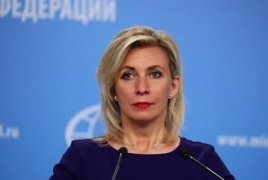
Russia has long regarded the Armenian people’s grief as its own, said Russian Foreign Ministry spokesperson Maria Zakharova during a briefing while addressing the Armenian Genocide of 1915.
“April 24 marks the 110th anniversary of one of the most tragic events of the first half of the 20th century – the Armenian Genocide in the Ottoman Empire. According to historical accounts, in 1915, the Caucasus Army of the Russian Imperial Army, under orders from Nicholas II, opened the Russian-Turkish border and saved no fewer than 350,000 Armenians,” Zakharova said at Thursday’s briefing.
She emphasized that Moscow’s stance on these tragic events is well established and rooted in humanitarian values.
“As early as 1915, through the efforts of Russian diplomacy led by Sergey Dmitriyevich Sazonov, leading members of the international community defined the events as crimes against humanity. Modern Russia was among the first countries in the world to recognize the Armenian Genocide in the Ottoman Empire. The State Duma of the Russian Federation passed resolutions in 1995 and 2005 condemning the Armenian Genocide of 1915–1922. In 2015, during a visit to Armenia, Russian President Vladimir Putin took part in a memorial ceremony for the victims and expressed sincere condolences to the Armenian people,” said Zakharova.
She added that many Russian cities, including Moscow, traditionally hold memorial events. These gatherings involve not only members of the Armenian community, but also people of various ethnicities united in preserving the memory of tragic historical events and resisting political manipulation of the past.
The 1915 Armenian Genocide is recognized as the first genocide of the 20th century. Turkey continues to deny accusations of the mass extermination of more than 1.5 million Armenians during World War I and reacts strongly to criticism from Western nations on this issue.
The Armenian Genocide has been acknowledged by many countries and international organizations. Uruguay was the first to recognize it in 1965, followed by Cyprus, Russia, Greece, Canada, the lower house of the Italian parliament, Lebanon, Belgium, France, Paraguay, Argentina, Sweden, Bolivia, the United Kingdom, the Netherlands, Slovakia, Germany, Lithuania, Venezuela, Poland, Chile, Switzerland, Brazil, Luxembourg, Austria, the Vatican, the Czech Republic, Denmark, Portugal, the interim government of Libya, 49 U.S. states, both chambers of the U.S. Congress, Syria, the European Parliament, and the World Council of Churches.

